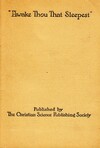

Are you sure?
This bookmark will be removed from all folders and any saved notes will be permanently removed.
Narcotics
Originally published in January 17, 1917 issue of The Christian Science Monitor
The significance of the word narcotic is admirably illustrated in the old Greek story which is supposed to have given birth to the word itself. Narcissus, the son of Cephisus, says Ovid, was captivated by the reflection of his own person in a certain fountain. Mistaking this for the nymph of the fountain he strove to reach her, with the result that he was drowned. In the place where he disappeared there grew up the flower named, after him, the narcissus, the eating of which is supposed to produce the numbness of drowning or of the sleep of death. Out of this, then, there gradually grew up the term narcotic, meaning anything soporific, anything producing drowsiness, stupor, or insensibility.
Now anybody who understands anything about the methods of the human mind knows that a drug acts in the exact ratio of the potency attributed to it by that mind. The difference, for instance, between opium and tobacco is solely inherent in the fact that the human mind endows the former with the power to reduce the smoker to insensibility, whilst it limits the power of the latter to that merely of a sedative. It is,therefore,obvious that the real narcotic, relatively speaking, is not the poppy nor the tobacco plant, but the belief about these in the human mind. Thus a man drugs himself not with the essence of a distilled plant, or the leaf of a sun-baked one, but by the mental pictures conjured up in his own consciousness. "Mortal belief", Mrs. Eddy writes, on page 174 of Science and Health, "is all that enables a drug to cure mortal ailments."
Once all this is perceived the student of Christian Science begins to comprehend how he may drug himself not alone with camomile or whiskey, but with envy, hatred, malice, and all uncharitableness; how he may succumb to narcotics not only in the shape of morphia and tobacco, but in the shape of lust, idleness, and dilettantism. And from this he learns that the final empire over these things is only gained when you reduce them to terms of nothingness. The man who believes in a body will always be subject to lust: the only way to prove your mastery over sleep is by remaining scientifically awake. "The depraved appetite for alcoholic drinks," writes Mrs. Eddy, on page 406 of Science and Health, "tobacco, tea, coffee, opium, is destroyed only by Mind's mastery of the body." And this mastery is acquired just as quickly as the human mind surrenders its belief in the reality of matter, in the face of the overwhelming fact that the image and likeness of Spirit must be spiritual and not material.
Enjoy 1 free Sentinel article or audio program each month, including content from 1898 to today.
JSH Collections
This article is included in:
1917 - PAMPHLET
Awake thou that sleepest
JSH-Online has hundreds of pamphlets, anthologies, and special editions for you to discover.


